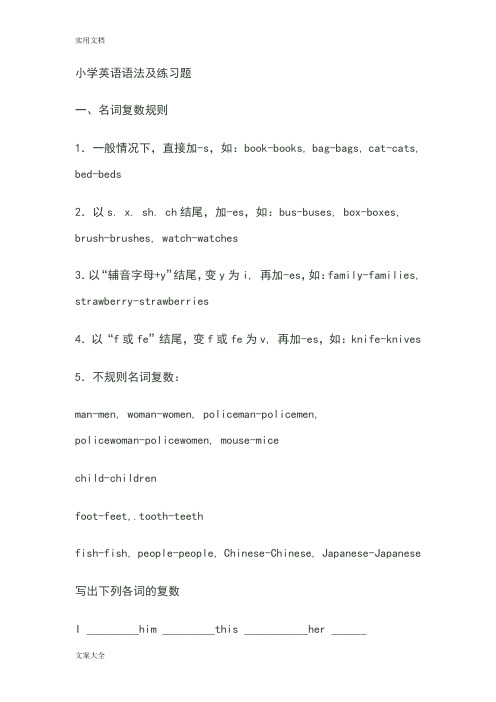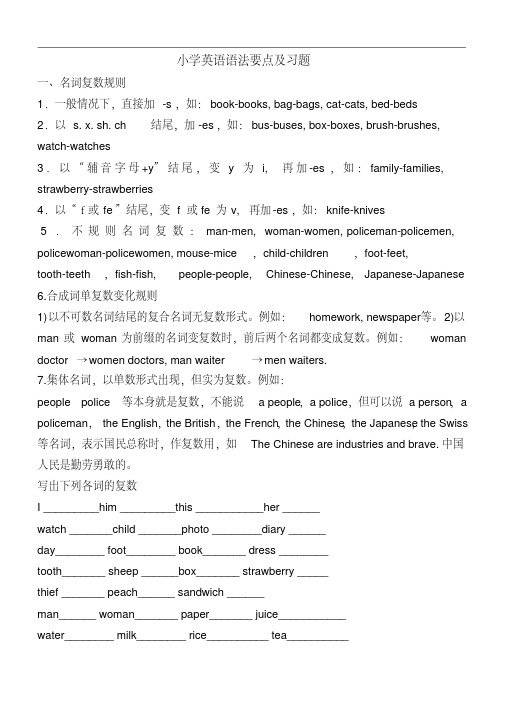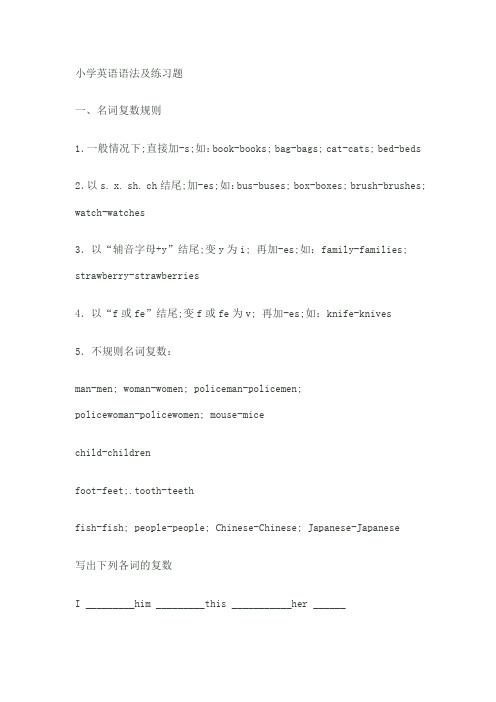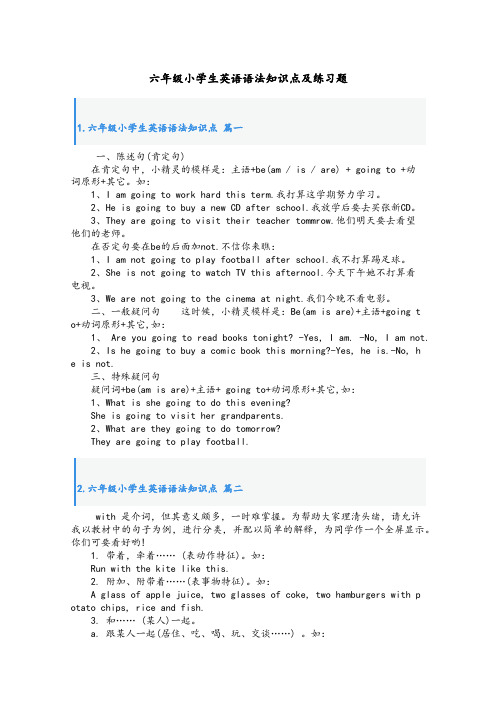(完整)小学英语六年级总复习语法及练习题(一).docx
人教版小学六年级总复习英语语法知识最全整理+语法专项训练题

小学英语语法知识最全整理+语法专项训练题一、小学英语语法知识最全整理第一章名词(Noun)名词的概念在生活中,我们会接触到各种各样的人和事物,用来表示这些人或事物名称的词就是名词。
一、名词的数名词的数指名词的单数和复数形式。
可数名词表示“一个”时用单数,“两个以上”时用复数;不可数名词表示量时,通常用“数词+单位+of+物质名词”的形式,如 a piece ofbread (一片面包),变为复数时,只须将单位名词变为复数,如:two pieces of bread(两片面包)。
*名词复数的构成法则1. 一般情况下在词尾加 s. 词尾读音shop --- shops (商店) 在清辅音后读 [ s ]bag --- bags (书包) 在浊辅音后读[ z ]window --- windows (窗户) 在元音后读 [ z ]2. 以 s, x, sh, ch结尾的单词在词尾加es。
class --- classes (班级) 词尾读音[ iz ]box --- boxes (盒子)match --- matches (比赛)brush --- brushes (刷子)3. 以“辅音字母 +y”结尾的词,变y为 i 加es.story --- stories (故事) 词尾读音[ iz ]4. 以“元音字母 +y”结尾的词,在词尾直接加skey --- keys 词尾读音[ z ]monkey --- monkeys5.以“o”结尾的名词,复数一般在词尾加“s”,但个别加“es”tomato --- tomatoes (西红柿) 词尾读音[ z ]potato --- potatoes (土豆)zoo --- zoos (动物园)photo --- photos (照片)*(以“o”结尾,复数加“es”)口诀:黑人(Negro)英雄(hero),左手拿着西红柿(tomato),右手拿着破土豆(potato),头顶一个大芒果(mango)。
(完整)小学英语六年级总复习语法及练习题(一)

小学英语语法及练习题一、名词复数规则1.一般情况下,直接加-s,如:book-books, bag-bags, cat-cats, bed-beds2.以s. x. sh. ch结尾,加-es,如:bus-buses, box-boxes, brush-brushes, watch-watches3.以“辅音字母+y”结尾,变y为i, 再加-es,如:family-families, strawberry-strawberries4.以“f或fe”结尾,变f或fe为v, 再加-es,如:knife-knives 5.不规则名词复数:man-men, woman-women, policeman-policemen,policewoman-policewomen, mouse-micechild-childrenfoot-feet,.tooth-teethfish-fish, people-people, Chinese-Chinese, Japanese-Japanese 写出下列各词的复数I _________him _________this ___________her ______watch _______child _______photo ________diary ______day________ foot________ book_______ dress ________tooth_______ sheep ______box_______ strawberry _____thief _______yo-yo ______ peach______ sandwich ______man______ woman_______ paper_______ juice___________ water________ milk________ rice__________ tea__________ 二、一般现在时一般现在时基本用法介绍【No. 1】一般现在时的功能1.表示事物或人物的特征、状态。
(完整版)小学英语(人教版PEP版)语法要点详解及练习题-六年级-小升初必备大全(17页)

小学英语(人教版PEP版)语法要点及习题1名词复数规则1.一般情况下,直接加-s,如:book-books, bag-bags, cat-cats, bed-beds2.以s. x. sh. ch结尾,加-es,如:bus-buses, box-boxes, brush-brushes, watch-watches 3.以“辅音字母+y”结尾,变y为i, 再加-es,如:family-families, strawberry-strawberries 以“f或fe”结尾,变f或fe为v, 再加-es,(但有一个特例:roof→roofs)。
如:knife-knives leaf-leaves wife-wives thief-thieves wolf-wolves5.以“o”结尾的单词,如果有生命,加-es;如果没有生命,加-s。
如:①有生命:potato-potatoes tomato-tomatoes mango-mangoeshero-heroes Negro- Negroes②没生命:radio-radios piano-pianos photo-photos zoo-zoos6.不规则名词的复数变化:(一)完全不规则:man-menwoman-womenpoliceman-policemenpolicewoman-policewomenmouse-micechild-childrenfoot-feettooth-teeth(二)单数复数词形相同:fish-fish sheep-sheep deer-deerpeople-peopleChinese-ChineseJapanese-Japanese小练习:写出下列各词的复数I _________him _________this ___________her ______watch _______child _______photo ________diary ______day________ foot________ book_______ dress ________tooth_______ sheep ______box_______ strawberry _____thief _______yo-yo ______ peach______ sandwich ______man______ woman_______ paper_______ juice___________water________ milk________ rice__________ tea__________小学英语(PEP版)语法总结及习题2一般现在时一般现在时基本用法介绍【No. 1】一般现在时的功能1.表示事物或人物的特征、状态。
小学六年级英语语法要点及习题总结.doc

小学英语语法要点及习题一、名词复数规则1.一般情况下,直接加-s,如:book-books, bag-bags, cat-cats, bed-beds2.以s. x. sh. ch结尾,加-es,如:bus-buses, box-boxes, brush-brushes, watch-watches3.以“辅音字母+y”结尾,变y为i, 再加-es,如:family-families, strawberry-strawberries4.以“f或fe”结尾,变f或fe为v, 再加-es,如:knife-knives5.不规则名词复数:man-men, woman-women, policeman-policemen, policewoman-policewomen, mouse-mice ,child-children ,foot-feet,tooth-teeth,fish-fish, people-people, Chinese-Chinese, Japanese-Japanese 6.合成词单复数变化规则1)以不可数名词结尾的复合名词无复数形式。
例如:homework, newspaper等。
2)以man或woman为前缀的名词变复数时,前后两个名词都变成复数。
例如:woman doctor→women doctors, man waiter→men waiters.7.集体名词,以单数形式出现,但实为复数。
例如:people police等本身就是复数,不能说 a people,a police,但可以说 a person,a policeman,the English,the British,the French,the Chinese,the Japanese,the Swiss 等名词,表示国民总称时,作复数用,如The Chinese are industries and brave.中国人民是勤劳勇敢的。
小学英语六年级总复习语法及练习题

小学英语语法及练习题一、名词复数规则1.一般情况下;直接加-s;如:book-books; bag-bags; cat-cats; bed-beds 2.以s. x. sh. ch结尾;加-es;如:bus-buses; box-boxes; brush-brushes; watch-watches3.以“辅音字母+y”结尾;变y为i; 再加-es;如:family-families; strawberry-strawberries4.以“f或fe”结尾;变f或fe为v; 再加-es;如:knife-knives5.不规则名词复数:man-men; woman-women; policeman-policemen;policewoman-policewomen; mouse-micechild-childrenfoot-feet;.tooth-teethfish-fish; people-people; Chinese-Chinese; Japanese-Japanese写出下列各词的复数I _________him _________this ___________her ______watch _______child _______photo ________diary ______day________ foot________ book_______ dress ________tooth_______ sheep ______box_______ strawberry _____thief _______yo-yo ______ peach______ sandwich ______man______ woman_______ paper_______ juice___________water________ milk________ rice__________ tea__________二、一般现在时一般现在时基本用法介绍No. 1一般现在时的功能1.表示事物或人物的特征、状态..如:The sky is blue.天空是蓝色的..2.表示经常性或习惯性的动作..如:I get up at six every day.我每天六点起床..3.表示客观现实..如:The earth goes around the sun.地球绕着太阳转..一般现在时的构成1. be动词:主语+beam;is;are+其它..如:I am a boy.我是一个男孩..2.行为动词:主语+行为动词+其它..如:We study English.我们学习英语..当主语为第三人称单数he; she;it时;要在动词后加"-s"或"-es"..如:Mary likes Chinese.玛丽喜欢汉语..一般现在时的变化1. be动词的变化..否定句:主语+ be + not +其它..如:He is not a worker.他不是工人..一般疑问句:Be +主语+其它..如:-Are you a student-Yes. I am. / No; I'm not.特殊疑问句:疑问词+一般疑问句..如:Where is my bike2.行为动词的变化..否定句:主语+ don't doesn't +动词原形+其它..如:I don't like bread.当主语为第三人称单数时;要用doesn't构成否定句..如:He doesn't often play.一般疑问句:Do Does +主语+动词原形+其它..如:- Do you often play football- Yes; I do. / No; I don't.当主语为第三人称单数时;要用does构成一般疑问句..如:- Does she go to work by bike- Yes; she does. / No; she doesn't.特殊疑问句:疑问词+一般疑问句..如:How does your father go to work动词+s的变化规则1.一般情况下;直接加-s;如:cook-cooks; milk-milks2.以s. x. sh. ch. o结尾;加-es;如:guess-guesses; wash-washes; watch-watches; go-goes3.以“辅音字母+y”结尾;变y为i; 再加-es;如:study-studies一般现在时用法专练:一、写出下列动词的第三人称单数drink ________ go _______ stay ________ make ________ look _________ have_______ pass_______ carry ____come________ watch______ plant_______ fly ________ study_______ brush________ do_________ teach_______二、用括号内动词的适当形式填空..1. He often ________have dinner at home.2. Daniel and Tommy _______be in Class One.3. We _______not watch TV on Monday.4. Nick _______not go to the zoo on Sunday.5. ______ they ________like the World Cup6. What _______they often _______do on Saturdays7. _______ your parents _______read newspapers every day8. The girl _______teach us English on Sundays.9. She and I ________take a walk together every evening.10. There ________be some water in the bottle.11. Mike _______like cooking.12. They _______have the same hobby.13. My aunt _______look after her baby carefully.14. You always _______do your homework well.15. I _______be ill. I’m staying in bed.16. She _______go to school from Monday to Friday.17. Liu Tao _______do not like PE.18. The child often _______watch TV in the evening.19. Su Hai and Su Yang _______have eight lessons this term.20. -What day _______be it today-It’s Saturday.三、按照要求改写句子1. Daniel watches TV every evening.改为否定句___________________________________________________2. I do my homework every day.改为一般疑问句;作否定回答________________________________________________________3. She likes milk.改为一般疑问句;作肯定回答___________________________4. Amy likes playing computer games.改为一般疑问句;作否定回答___________________________________________________5. We go to school every morning.改为否定句_______________________________________________________6. He speaks English very well.改为否定句___________________________________________________7. I like taking photos in the park.对划线部分提问________________________________________________________8. John comes from Canada.对划线部分提问___________________________________________________9. She is always a good student.改为一般疑问句;作否定回答________________________________________________________10. Simon and Daniel like going skating.改为否定句___________________________________________________五、改错划出错误的地方;将正确的写在横线上1. Is your brother speak English __________________2. Does he likes going fishing __________________3. He likes play games after class. __________________4. Mr. Wu teachs us English. __________________5. She don’t do her homework on Sundays. _________________三、现在进行时1.现在进行时表示现在正在进行或发生的动作;也可表示当前一段时间内的活动或现阶段正在进行的动作..2.现在进行时的肯定句基本结构为be+动词ing.3.现在进行时的否定句在be后加not..4.现在进行时的一般疑问句把be动词调到句首..5.现在进行时的特殊疑问的基本结构为:疑问词不达意 + be + 主语 + 动词ing但疑问词当主语时其结构为:疑问词不达意 + be + 动词ing动词加ing的变化规则1.一般情况下;直接加ing;如:cook-cooking2.以不发音的e结尾;去e加ing;如:make-making; taste-tasting 3.如果末尾是一个元音字母和一个辅音字母;双写末尾的辅音字母;再加ing;如:run-running; stop-stopping现在进行时专项练习:一、写出下列动词的现在分词:play________ run__________ swim _________make__________go_________ like________ write________ _ski___________read________ have_________ sing ________ dance_________put_________ see________ buy _________ love____________live_______ take_________ come ________ get_________stop_________ sit ________ begin________ shop___________二、用所给的动词的正确形式填空:1.The boy __________________ drawa picture now.2. Listen .Some girls _______________ singin the classroom .3. My mother _________________ cook some nice food now.4. What _____ you ______ do now5. Look . They _______________ have an English lesson .6.They ____________not ;water the flowers now.7.Look the girls ________________dance in the classroom .8.What is our granddaughter doing She _________listen to music.9. It’s 5 o’clock now. We _____________havesupper now10.______Helen____________wash clothes Yes ;she is .三、句型转换:1. They are doing housework .分别改成一般疑问句和否定句__________________________________________________________________________________________________________________________2.The students are cleaning the classroom . 改一般疑问句并作肯定和否定回答__________________________________________________________________________________________________________________________________3.I’m playing the football in the playground .对划线部分进行提问_________________________________________________________________4.Tom is reading books in his study . 对划线部分进行提问四、将来时理论及练习一、概念:表示将要发生的动作或存在的状态及打算、计划或准备做某事..句中一般有以下时间状语:tomorrow; next dayweek; month; yea r…;soon; the day after tomorrow后天等..二、基本结构:①be going to + do;②will+ do.三、否定句:在be动词am; is; arel后加not或情态动词will后加not 成won’t..例如:I’m going to have a picnic this afternoon.→ I’m not going to have a picnic this afternoon.四、一般疑问句: be或will提到句首;some改为any; and改为or;第一二人称互换..例如:We are going to go on an outing this weekend. → Are you going to go on an outing this weekend五、对划线部分提问..一般情况;一般将来时的对划线部分有三种情况..1. 问人..Who 例如:I’m going to New York soon. →Who’s going to New York soon.2. 问干什么..What … do.例如: My father is going to watch a race with me thisafternoon. →What is your father going to do with you this afternoon.3. 问什么时候..When.例如:She’s going to go to bed at nine. →When is she goingto bed六、同义句:be going to = willI am going to go swimming tomorrow明天. = I will go swimming tomorrow.练习:填空..1. 我打算明天和朋友去野炊..I_____ _______ _________ have a picnic with my friends.I ________ have a picnic with my friends.2. 下个星期一你打算去干嘛我想去打篮球..What ________ ________ _________ _________ _________ next Monday I _______ ______ _____ play basketball.What _________ you do next Monday I ________ play basketball.3. 你妈妈这个周末去购物吗是;她要去买一些水果.._____ your mother _______ ________ go shopping this ___________ Yes; she _________. She ______ ________ __________ buy some fruit. 4. 你们打算什么时候见面..What time _______ you _________ __________ meet改句子..5. Nancy is going to go camping.改否定Nancy ________ going to go camping.6. I’ll go and join them.改否定I _______ go ______ join them.7. I’m going to get up at 6:30 tomorrow.改一般疑问句________ _______ ________ to get up at 6:30 tomorrow8. We will meet at the bus stop at 10:30.改一般疑问句_______ ________ meet at the bus stop at 10:30.9. She is going to listen to music after school.对划线部分提问________ _______ she ________ ________ _________ after school 10. My father and mother are going to see a play the day after tomorrow.同上_________ _________ going to see a play the day after tomorrow.用所给词的适当形式填空..11. Today is a sunny day. We ___________________ have a picnic this afternoon.12. My brother _______________ go to Shanghai next week.13. Tom often ______________go to school on foot. But today is rain. He ______________ go to school by bike.14. What do you usually do at weekends I usually __________ watch TV and ____________catch insects15. It’s Friday today. What _____she _________ do this weekend She ______________ watch TV and _____________ catch insects.16. What ___________ d0 you do last Sunday I ____________ pick apples on a farm. What ______________ do next Sunday I______________ milk cows.17. Mary ____________ visit her grandparents tomorrow.18. Liu Tao ____________ fly kites in the playground yesterday.19. David ______________ give a puppet show next Monday.20. I ________________ plan for my study now五、一般过去时1.一般过去时表示过去某个时间发生的动作或存在的状态;常和表示过去的时间状语连用..一般过去时也表示过去经常或反复发生的动作感谢.. 2.Be动词在一般过去时中的变化:⑴am 和is在一般过去时中变为was..was not=wasn’t⑵are在一般过去时中变为were..were not=weren’t⑶带有was或were的句子;其否定、疑问的变化和is; am; are一样;即否定句在was或were后加not;一般疑问句把was或were调到句首.. 3.句中没有be动词的一般过去时的句子否定句:didn’t +动词原形;如:Jim didn’t go home yesterday.一般疑问句:在句首加did;句子中的动词过去式变回原形..如:Did Jim go home yesterday特殊疑问句:⑴疑问词+did+主语+动词原形如: What did Jim do yesterday⑵疑问词当主语时:疑问词+动词过去式如:Who went to home yesterday动词过去式变化规则:1.一般在动词末尾加-ed;如:pull-pulled; cook-cooked2.结尾是e加d;如:taste-tasted3.末尾只有一个元音字母和一个辅音字母的重读闭音节;应双写末尾的辅音字母;再加-ed;如:stop-stopped4.以“辅音字母+y”结尾的;变y为i; 再加-ed;如:study-studied 5.不规则动词过去式:am;is-was; are-were; do-did; see-saw; say-said; give-gave; get-got; go-went; come-came; have-had; eat-ate; take-took; run-ran;sing-sang; put-put; make-made; read-read; write-wrote; draw-drew; drink-drank; fly-flew; ride-rode; speak-spoke; sweep-swept;swim-swam; sit-sat过去时练习写出下列动词的过去式isam_________ fly_______ plant________ are ________drink_________ play_______ go________ make ________does_________ dance________ worry________ ask _____taste_________ eat__________ draw________ put ______throw________ kick_________ pass_______ do ________Be动词的过去时练习1Name ____________ No. ______ Date __________一、用be动词的适当形式填空1. I _______ at school just now.2. He ________ at the camp last week.3. We ________ students two years ago.4. They ________ on the farm a moment ago.5. Yang Ling ________ eleven years old last year.6. There ________ an apple on the plate yesterday.7. There ________ some milk in the fridge on Sunday.8. The mobile phone _______ on the sofa yesterday evening.二、句型转换1. It was exciting.否定句:________________________________________________一般疑问句:____________________________________________肯、否定回答:__________________________________________ 2. All the students were very excited.否定句:________________________________________________一般疑问句:____________________________________________肯、否定回答:__________________________________________ 3. They were in his pocket.否定句:________________________________________________一般疑问句:____________________________________________肯、否定回答:__________________________________________ Be动词的过去时练习2Name ____________ No. ______ Date __________一、用be动词的适当形式填空1. I ______ an English teacher now.2. She _______ happy yesterday.3. They _______ glad to see each other last month.4. Helen and Nancy ________ good friends.5. The little dog _____ two years old this year.6. Look; there ________ lots of grapes here.7. There ________ a sign on the chair on Monday..8. Today _____ the second of June. Yesterday ______ the first of June. It _____ Children’s Day. All the stud ents ______ very excited.二、句型转换1. There was a car in front of the house just now.否定句:________________________________________________一般疑问句:____________________________________________肯、否定回答:__________________________________________肯、否定回答:__________________________________________三、中译英1.我的故事书刚才还在手表旁边..___________________________________________________________ 2.他们的外套上个礼拜放在卧室里了..___________________________________________________________ 3.一会以前花园里有两只小鸟..行为动词的过去时练习1Name ____________ No. ______ Date __________一、用行为动词的适当形式填空1. He _________ live in Wuxi two years ago.2. The cat ________ eat a bird last night.3. We _______ have a party last Halloween.4. Nancy ________ pick up oranges on the farm last week.5. I ________ make a model ship with Mike yesterday.6. They ________ play chess in the classroom last PE lesson.7. My mother _______ cook a nice food last Spring Festival.8. The girls ________ sing and _______ dance at the party.二、句型转换1. Su Hai took some photos at the Sports day.否定句:________________________________________________一般疑问句:____________________________________________肯、否定回答:__________________________________________2. Nancy went to school early.否定句:________________________________________________一般疑问句:____________________________________________肯、否定回答:__________________________________________3. We sang some English songs.否定句:________________________________________________一般疑问句:____________________________________________肯、否定回答:__________________________________________行为动词的过去时练习2Name ____________ No. ______ Date __________一、用be动词的适当形式填空1. I ______ watch a cartoon on Saturday.2. Her father _______ read a newspaper last night.3. We _________ to zoo yesterday; we _____ to the park. go4. ______ you _______ visit your relatives last Spring Festival5. ______ he _______ fly a kite on Sunday Yes; he ______.6. Gao Shan _______ pull up carrots last National Day holiday.7. I ____________ sweep the floor yesterday; but my mother ______.8. What ______ she _______ find in the garden last morning She __________ find a beautiful butterfly.二、句型转换1. They played football in the playground.否定句:________________________________________________一般疑问句:____________________________________________肯、否定回答:__________________________________________三、中译英1. 格林先生去年住在中国..________________________________________________________ 2. 昨天我们参观了农场..________________________________________________________ 3. 他刚才在找他的手机..________________________________________________________过去时综合练习1Name ____________ No. ______ Date __________一、用动词的适当形式填空1. It ______ be Ben’s birthday last Friday.2. We all ______ have a good time last night.3. He ________ jump high on last Sports Day.4. Helen ________ milk a cow on Friday.5. She likes ______ newspapers; but she ______ a book yesterday. read6. He _______ football now; but they _______ basketball just now. play7. Jim’s mother _________ plant trees just now.8. _______ they ________ sweep the floor on Sunday No; they _____.9. I _______ watch a cartoon on Monday.10. We ___________ go to school on Sunday.。
六年级小学生英语语法知识点及练习题

六年级小学生英语语法知识点及练习题1.六年级小学生英语语法知识点篇一一、陈述句(肯定句)在肯定句中,小精灵的模样是:主语+be(am / is / are) + going to +动词原形+其它。
如:1、I am going to work hard this term.我打算这学期努力学习。
2、He is going to buy a new CD after school.我放学后要去买张新CD。
3、They are going to visit their teacher tommrow.他们明天要去看望他们的老师。
在否定句要在be的后面加not.不信你来瞧:1、I am not going to play football after school.我不打算踢足球。
2、She is not going to watch TV this afternool.今天下午她不打算看电视。
3、We are not going to the cinema at night.我们今晚不看电影。
二、一般疑问句这时候,小精灵模样是:Be(am is are)+主语+going to+动词原形+其它,如:1、 Are you going to read books tonight? -Yes, I am. -No, I am not.2、Is he going to buy a comic book this morning?-Yes, he is.-No, he is not.三、特殊疑问句疑问词+be(am is are)+主语+ going to+动词原形+其它,如:1、What is she going to do this evening?She is going to visit her grandparents.2、What are they going to do tomorrow?They are going to play football.2.六年级小学生英语语法知识点篇二with 是介词,但其意义颇多,一时难掌握。
小学英语语法--六年级毕业复习练习题(1)
小学英语语法毕业系统复习小学英语系统复习(句型转换)1. That is a chair. (变一般疑问句)2. That`s my teacher.3. This is letter D.4. I`m Alice.(变同义句)5. My name is Ben.6. I`m fine.7. Tom is here.(变一般疑问句)8. This is Bob.9. I`m Li Lei. (变一般疑问句)10. Is this a book?(肯定回答)11. This is a pencil-case.(变否定句)12. Is that her key?(做出否定回答)13. This is a pen in English.14. It is an English book.15. This is my book.(复数).16. Is that a cat.(复数)17. Is that a cat?主(变复数)18. His baseball is under the table. (变一般疑问句)19. I go to school by bike.20. I often go hiking on the weekend. (变一般疑问句)21. She is drawing a picture now.22. Is the cat eating fish?(肯定回答)23. I went to guangzhou last week.24. Jim planted trees yeeterday.25. It was sunny yesterday.(变否定句)26. The apples are five yuan.27. There is a T-shirt in the box.(变复数句)28. My mem cleans the room every day.(变否定句)29. Peter is going to fly a kite next Sunday.30. My bag is red.31. This shirt is very nice.(变为否定句)32. What`s the matter?(变同义句)33. Tom is tall,but denny is short.(改为比较句)34. He goes to work by bike.35. We are going to go hiking this Friday.36. I like white best.37. We are going to shanghai38. She is washing the clothes.39. The pens are in the pencil-case.40. He`s going to the Great Wall.(变否定句)41. It is an elephant.42. Miss Xu is a good teacher. (变一般疑问句,肯定回答)43. It`s our flag.44. The young girl is my sister.45. My name is Alice.46. She didn`t do homework yesterday.(变为肯定句)47. I`m from China.48. Tom is cleaning the classroom. (变一般疑问句)49. She often washes the clothes. (变一般疑问句)50. These are maps.(变为单数)51. This is a beautiful bee.52. Is there a book in the deak?(变成复数句)53. There are four chairs in the dinning room.54. Can you play football?(否定回答)55. Xiao ming likes drawing. (变一般疑问句,否定回答)56. My mother works in a hospital.57. Ma Na`s uncle live in beijing.58. They walk in the street every evening.59. I often go swimming on Sundays.60. Mark doesn`t like playing the piano.61. Is your father going to see your uncle?(变肯定句)62. The children are going to the zoo next weekend.63. I did my homework yesterday evening.64. Miss Li saw the boy this morning.(变一般疑问句)65. Lily ang Lucy went ice_skating yesterday.66. It`s seven o`clock.67. I can see three pencils in the pencil-case.小学英语系统总复习(代词)一、写出下列单词的正确形式:宾格形容词性物主代词名词性物主代词I ————————————————you ————————————————he ————————————————she ————————————————it ————————————————we ————————————————they ————————————————二、根据汉语提示,用人称代词的适当形式填空:1.————(我) am a teacher .2. ————(她) is eleven years old.3. ————(他) studies in NO.1 primary School.4.————(我们) have English ,mach, Chinese today.5.________ (它) is a map of China.6.Mr Brown help ________(我)wash the car.7. I saw ________ (你) in the bookstore yesterday.8. Please give_________ (他) an English book.9.The blue bike is ____________(我的)。
(word完整版)小学英语六年级英语语法及测试题(2021年整理)
(word完整版)小学英语六年级英语语法及测试题(word版可编辑修改) 编辑整理:尊敬的读者朋友们:这里是精品文档编辑中心,本文档内容是由我和我的同事精心编辑整理后发布的,发布之前我们对文中内容进行仔细校对,但是难免会有疏漏的地方,但是任然希望((word完整版)小学英语六年级英语语法及测试题(word版可编辑修改))的内容能够给您的工作和学习带来便利。
同时也真诚的希望收到您的建议和反馈,这将是我们进步的源泉,前进的动力。
本文可编辑可修改,如果觉得对您有帮助请收藏以便随时查阅,最后祝您生活愉快业绩进步,以下为(word完整版)小学英语六年级英语语法及测试题(word版可编辑修改)的全部内容。
牛津小学英语六年级英语语法及测试题Fill in the blank with “have, has" or “there is ,there are” 1。
I ________a good father and a good mother。
2。
____________a telescope on the desk.3. He _________a tape—recorder。
4。
_____________a basketball in the playground.5。
She __________some dresses。
6. They ___________a nice garden.7。
What do you___________?8. ______________a reading-room in the building?9。
What does Mike___________?10. ______________any books in the bookcase?11. My father _________a story—book。
12。
_______________a story-book on the table.13. _______________any flowers in the vase?14。
(完整word)六年级英语语法专项练习试题.docx
(完整word)六年级英语语法专项练习试题.docx六年级英语语法专项练习试题六年级英语语法专项练习一般现在时一、意1.表示事物或人物的特征、状。
如:The sky is blue. 天空是色的。
2.表示常性或性的作。
如:I get up at six every day. 我每天六点起床。
3.表示客。
如:The earth goes around the sun. 地球着太阳。
二、构成及化1.be 的化。
肯定句:主+be(am,is,are)+ 其它。
如: I am a boy. 我是一个男孩。
否定句:主+ be + not + 其它。
如:He is not a worker. 他不是工人。
一般疑句:Be + 主 + 其它。
如:-Are you a student? -Yes. I am. / No, I'm not.特殊疑句:疑+ 一般疑句。
如:Where is my bike?2.行的化。
①当主第一,二人称及复数,助do肯定句:主+ 原形(+其它)。
如:We often play basketball after school.否定句:主 + don't+ 原形 (+ 其它 )。
如:we don’ t play basketball after school.一般疑句: Do + 主 + 原形 + 其它 ?如: Do you often play basketball after school l? Yes, we do. / No, we don't.特殊疑句:疑 + 以 do 开的一般疑句 ?如: What do you often do after school ?②当主第三人称数,助 does肯定句:主 + 三式 (+ 其它 )。
如: He swims well.否定句:主+ doesn’ t+原形(+ 其它)。
如:He doesn’ t swim well..一般疑句: Does +主 +原形 +其它。
六年级期末语法总复习及练习
一、名词复数规则1.一般情况下,直接加-s,如:book-books,bag-bags, cat-cats, bed-beds2.以s. x. sh. ch结尾,加-es,如:bus-buses, box-boxes, brush-brushes, watch-watches3.以“辅音字母+y”结尾,变y为i, 再加-es,如:family-families, strawberry-strawberriesBoy- boys4.以“f或fe”结尾,变f或fe为v, 再加- es,如:knife-knives5.不规则名词复数:man-men, woman-women, policeman-policemen, German Germanspolicewoman-policewomen, mouse-mice child-children把-OO变成-EEfoot-feet tooth-teeth goose-geese单复数同形fish-fish, people-people, Chinese-Chinese, Japanese-Japanese sheep-sheep写出下列各词的复数watch child photo diaryday foot book dresstooth sheep box strawberrythief yo-yo peach sandwichMan woman paper juicewater milk rice tea二、一般现在时一般现在时基本用法介绍【No. 1】一般现在时的功能1.表示事物或人物的特征、状态。
如:The sky is blue.天空是蓝色的。
2.表示经常性或习惯性的动作。
如:I get up at six every day.我每天六点起床。
3.表示客观现实。
如:The earth goes around the sun.地球绕着太阳转。
一般现在时的构成1. be动词:主语+be(am,is,are)+其它。
- 1、下载文档前请自行甄别文档内容的完整性,平台不提供额外的编辑、内容补充、找答案等附加服务。
- 2、"仅部分预览"的文档,不可在线预览部分如存在完整性等问题,可反馈申请退款(可完整预览的文档不适用该条件!)。
- 3、如文档侵犯您的权益,请联系客服反馈,我们会尽快为您处理(人工客服工作时间:9:00-18:30)。
小学英语语法及练习题一、名词复数规则1.一般情况下,直接加 -s ,如: book-books, bag-bags, cat-cats, bed-beds2.以 s. x. sh. ch结尾,加-es,如:bus-buses, box-boxes, brush-brushes, watch-watches3.以“辅音字母 +y”结尾,变 y 为 i,再加-es,如:family-families, strawberry-strawberries4.以“f 或 fe ”结尾,变 f 或 fe 为 v,再加-es,如:knife-knives 5.不规则名词复数:man-men, woman-women, policeman-policemen,policewoman-policewomen, mouse-micechild-childrenfoot-feet,.tooth-teethfish-fish, people-people, Chinese-Chinese, Japanese-Japanese写出下列各词的复数I _________him _________this ___________her ______watch _______child _______photo ________diary ______day________ foot________ book_______ dress ________tooth_______ sheep ______box_______ strawberry _____thief _______yo-yo ______ peach______ sandwich ______man______ woman_______ paper_______juice___________ water________ milk________ rice__________ tea__________二、一般现在时一般现在时基本用法介绍【No. 1 】一般现在时的功能1. 表示事物或人物的特征、状态。
如:The sky is blue.天空是蓝色的。
2. 表示经常性或习惯性的动作。
如:I get up at six every day.我每天六点起床。
3.表示客观现实。
如: The earth goes around the sun. 地球绕着太阳转。
一般现在时的构成1. be 动词:主语 +be(am,is,are)+其它。
如:I am a boy.我是一个男孩。
2.行为动词:主语 +行为动词 (+ 其它 ) 。
如:We study English.我们学习英语。
当主语为第三人称单数(he, she,it)时,要在动词后加"-s"或"-es" 。
如: Mary likes Chinese.玛丽喜欢汉语。
一般现在时的变化1.be 动词的变化。
否定句:主语 + be + not +其它。
如: He is not a worker.他不是工人。
一般疑问句: Be +主语 +其它。
如: -Are you a student?-Yes. I am. / No, I'm not.特殊疑问句:疑问词 +一般疑问句。
如: Where is my bike?2.行为动词的变化。
否定句:主语 + don't( doesn't ) +动词原形(+其它)。
如:I don't like bread.当主语为第三人称单数时,要用doesn't构成否定句。
如:He doesn't often play.一般疑问句: Do( Does ) + 主语 +动词原形 +其它。
如:-Do you often play football?-Yes, I do. / No, I don't.当主语为第三人称单数时,要用does 构成一般疑问句。
如:-Does she go to work by bike?-Yes, she does. / No, she doesn't.特殊疑问句:疑问词 +一般疑问句。
如: Howdoes your father go to work?动词 +s 的变化规则1.一般情况下,直接加 -s ,如: cook-cooks, milk-milks2.以 s. x. sh. ch. o 结尾,加-es ,如:guess-guesses,wash-washes, watch-watches, go-goes3.以“辅音字母 +y”结尾,变 y 为 i,再加-es,如:study-studies一般现在时用法专练 :一、写出下列动词的第三人称单数drink ________ go _______ stay ________ make ________ look _________ have_______ pass_______carry ____ come________watch______ plant_______ fly ________ study_______ brush________ do_________teach_______二、用括号内动词的适当形式填空。
1.He often ________(have) dinner at home.2.Daniel and Tommy _______(be) in Class One.3.We _______(not watch) TV on Monday.4.Nick _______(not go) to the zoo on Sunday.5.______ they ________(like) the World Cup?6.What _______they often _______(do) on Saturdays?7._______ your parents _______(read) newspapers every day?8.The girl _______(teach) us English on Sundays.9.She and I ________(take) a walk together every evening.10.There ________(be) some water in the bottle.11.Mike _______(like) cooking.12.They _______(have) the same hobby.13.My aunt _______(look) after her baby carefully.14.You always _______(do) your homework well.15. I _______(be) ill. I’m staying in bed.16.She _______(go) to school from Monday to Friday.17.Liu Tao _______(do) not like PE.18.The child often _______(watch) TV in the evening.19.Su Hai and Su Yang _______(have) eight lessons this term.20.-What day _______(be) it today?-It ’s Saturday. 三、按照要求改写句子1. Daniel watches TV every evening.(改为否定句)___________________________________________________2. I do my homework every day.(改为一般疑问句,作否定回答) ________________________________________________________3.She likes milk.(改为一般疑问句,作肯定回答)___________________________4. Amy likes playing computer games.(改为一般疑问句,作否定回答 )___________________________________________________5. We go to school every morning.(改为否定句)_______________________________________________________ 6. He speaks English very well.(改为否定句)___________________________________________________7. I like taking photos in the park.(对划线部分提问)________________________________________________________ 8. John comes from Canada.(对划线部分提问)___________________________________________________9. She is always a good student.(改为一般疑问句,作否定回答)________________________________________________________ 10. Simon and Daniel like going skating.(改为否定句)___________________________________________________五、改错 ( 划出错误的地方,将正确的写在横线上)1. Is your brother speakEnglish?__________________2. Does he likes goingfishing?__________________3. He likes play games afterclass.__________________4. Mr. Wu teachs usEnglish.__________________5. She don ’ t do her homework on Sundays. _________________三、现在进行时1.现在进行时表示现在正在进行或发生的动作,也可表示当前一段时间内的活动或现阶段正在进行的动作。
2.现在进行时的肯定句基本结构为be+动词 ing.3.现在进行时的否定句在be 后加 not 。
